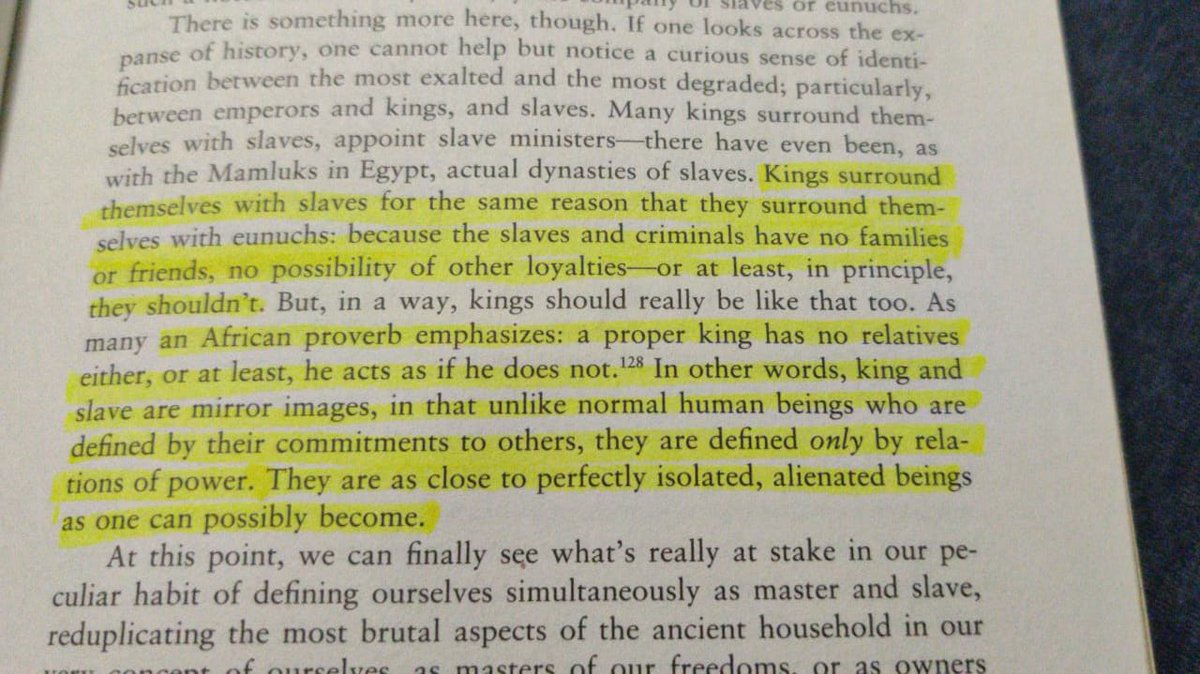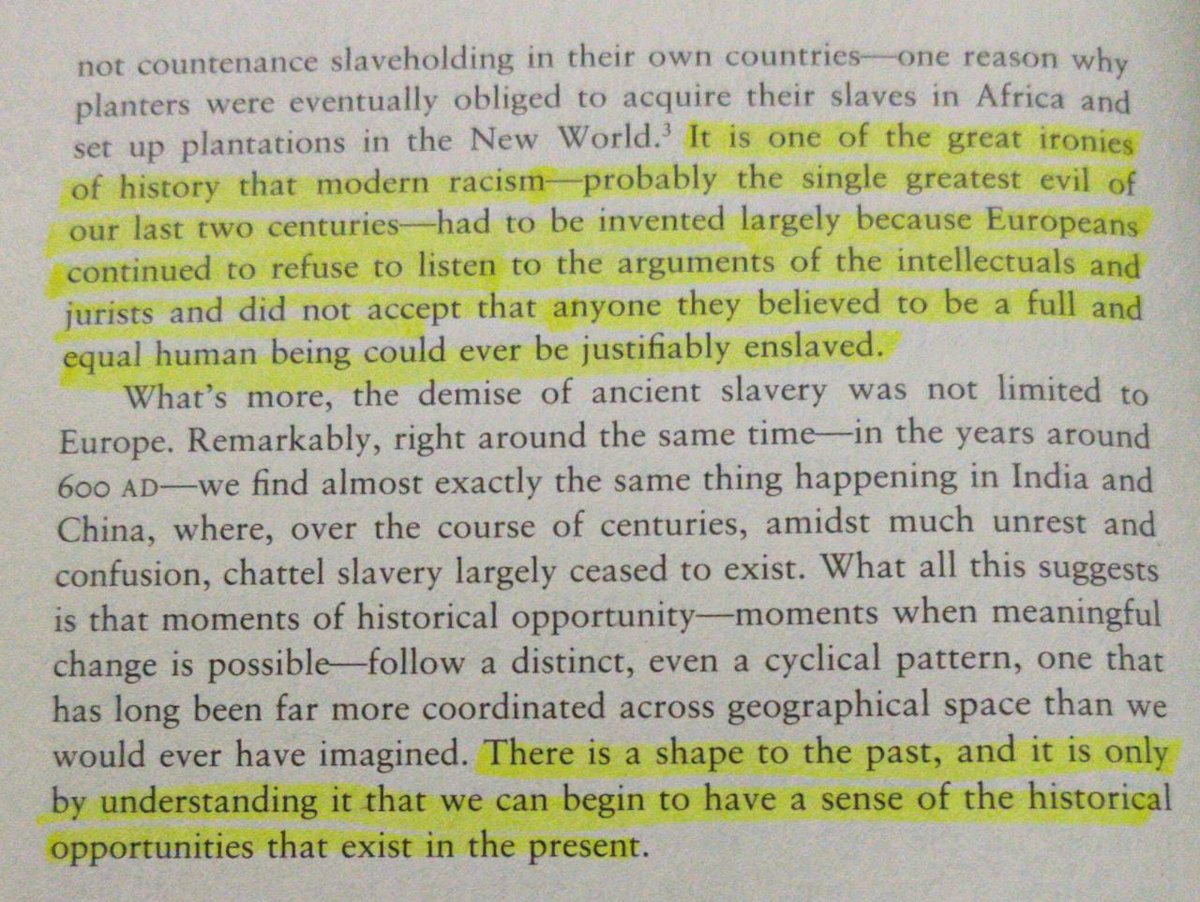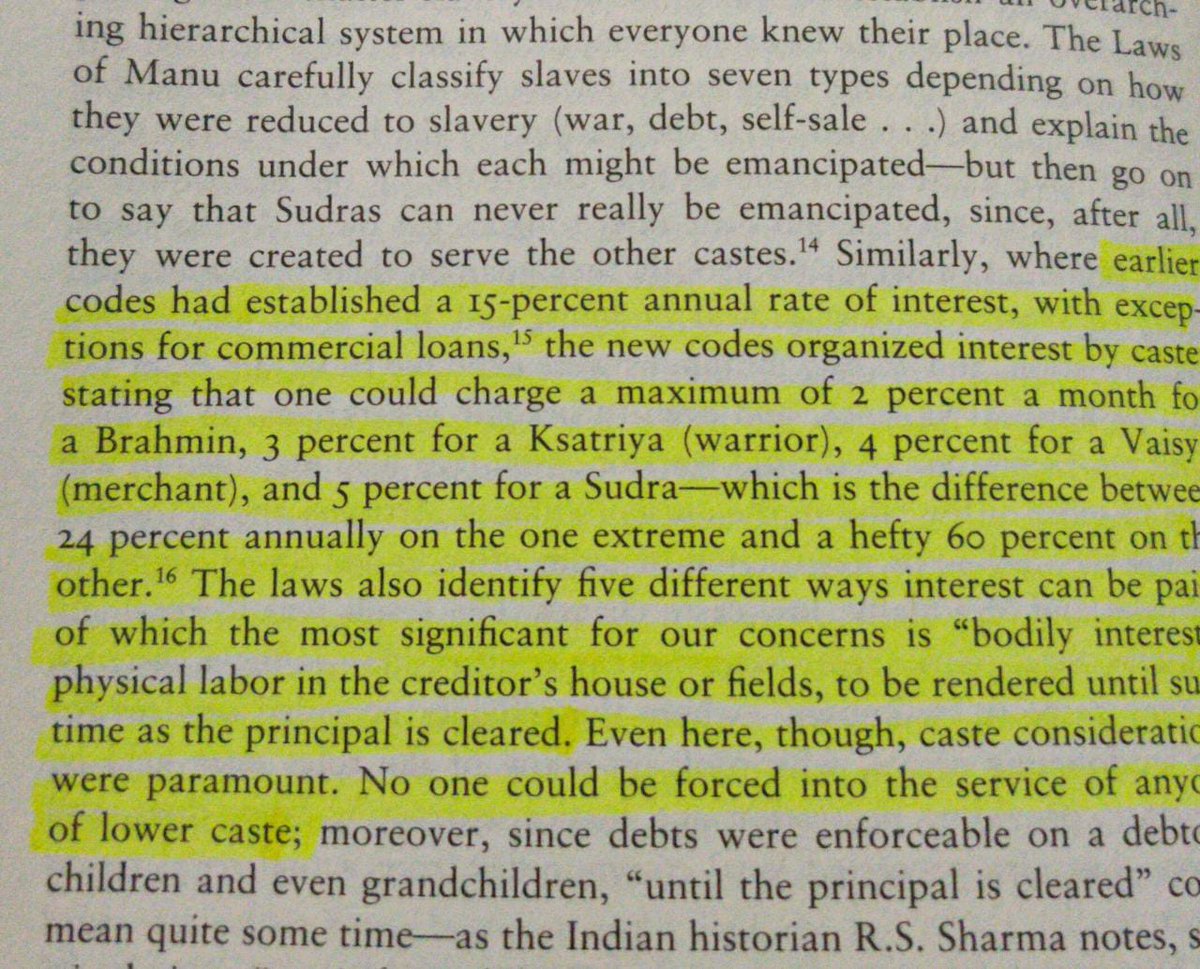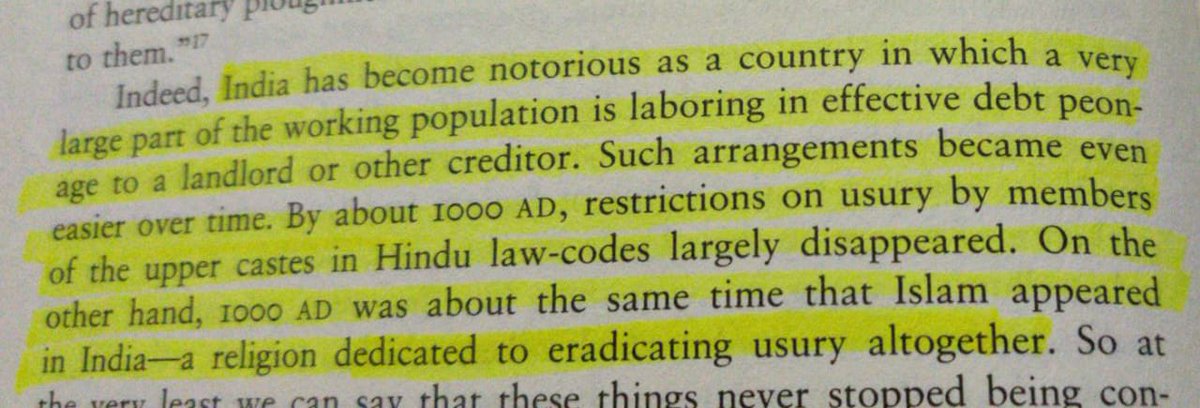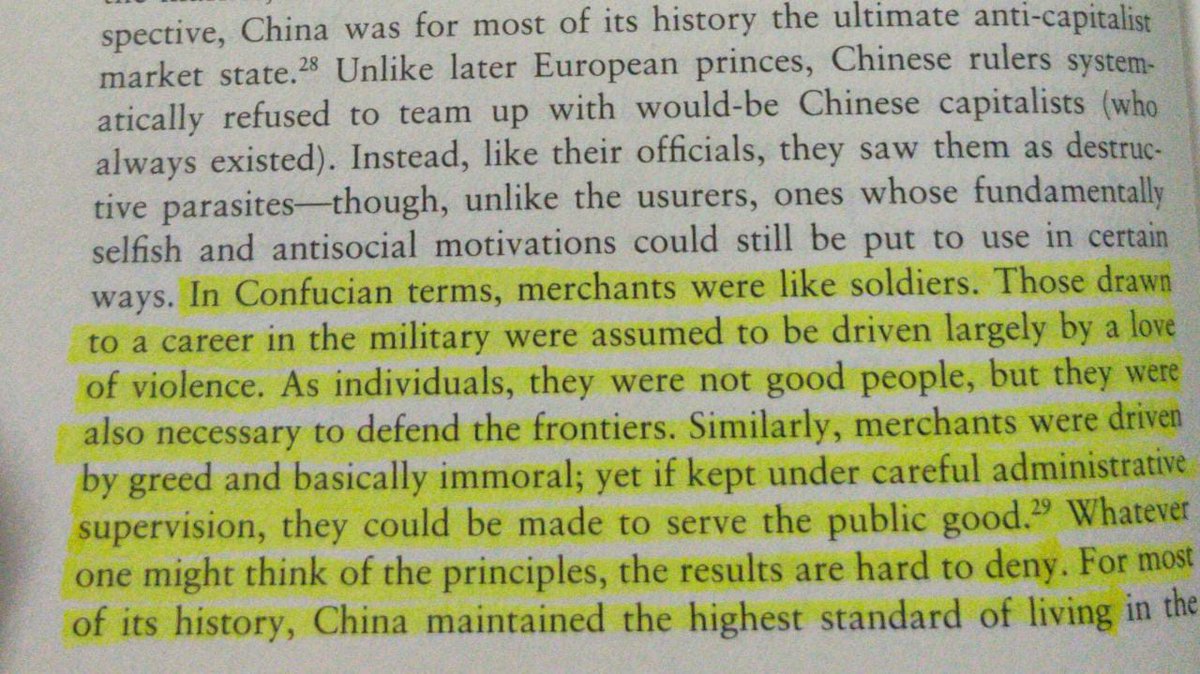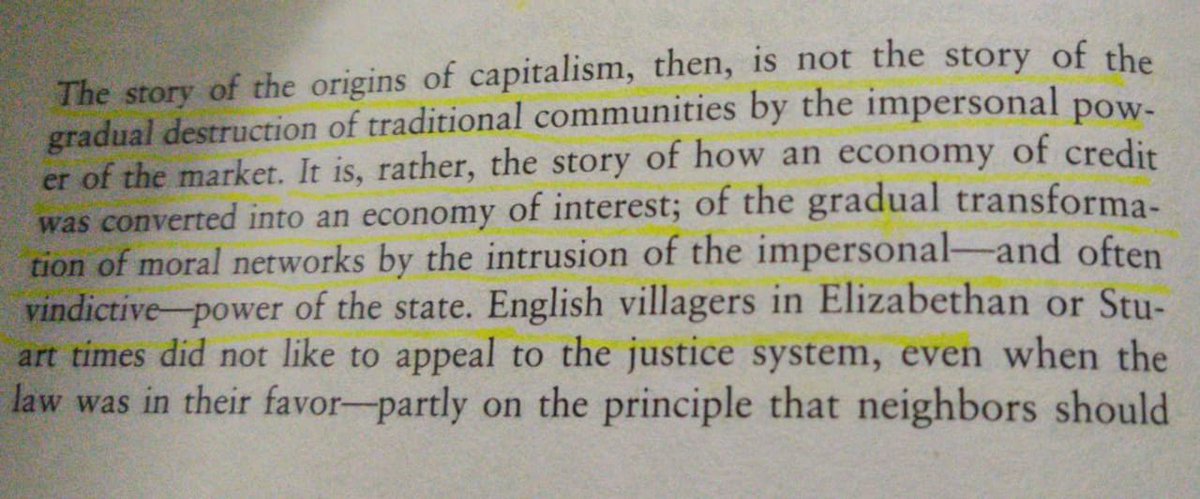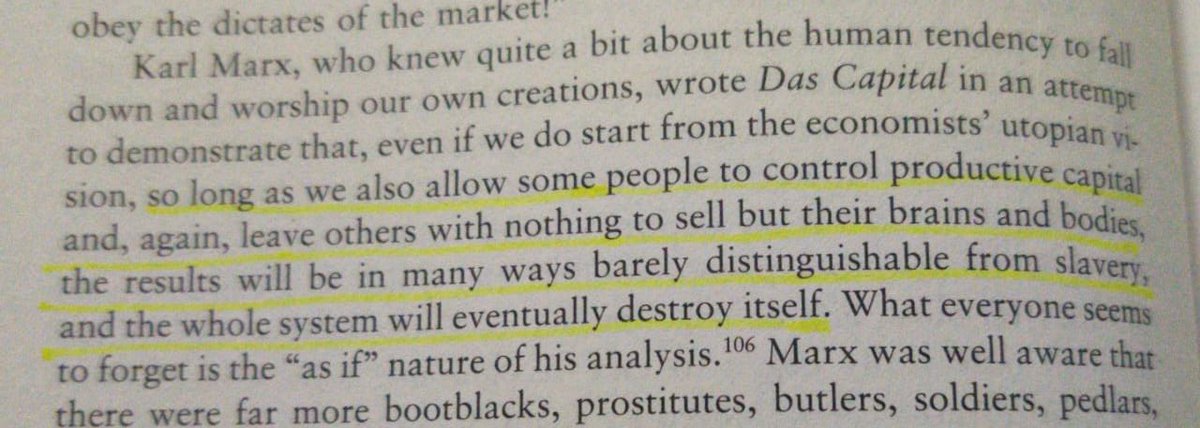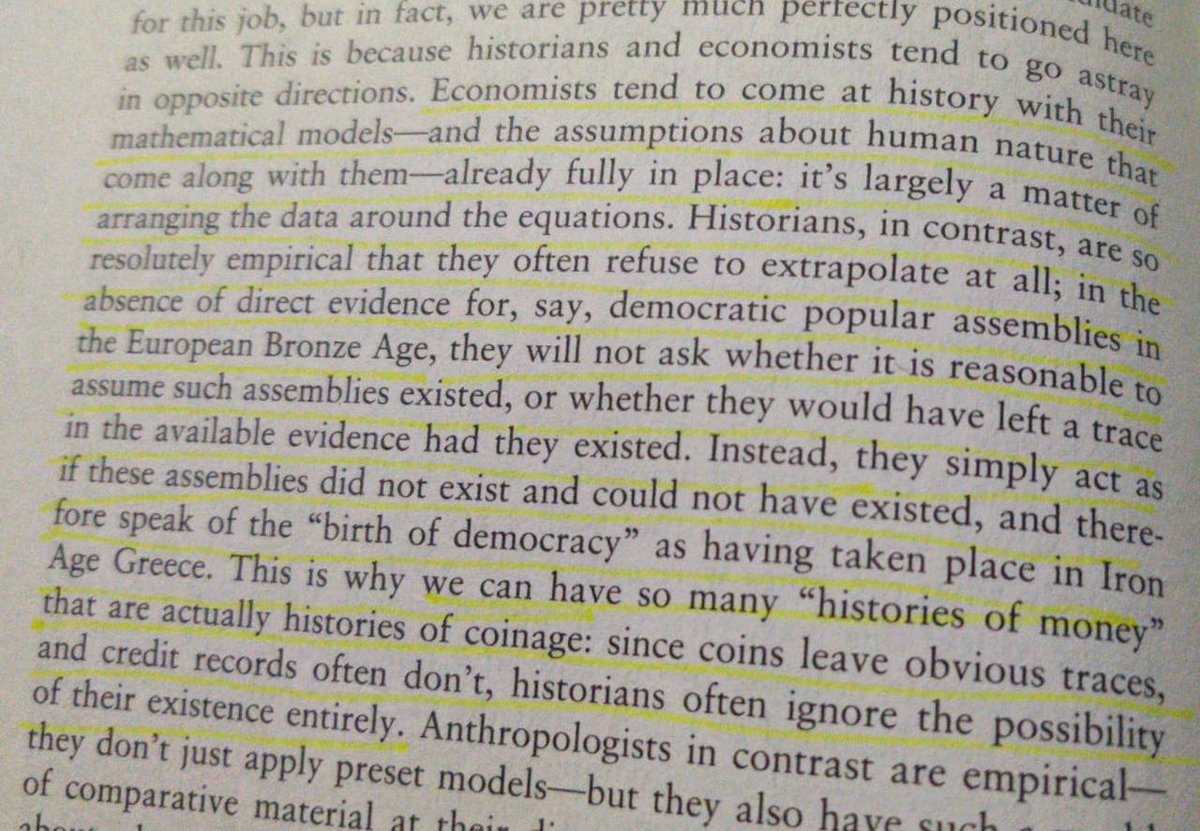Just Finished reading "Debt: The First 5000 Year " by David Graeber. It& #39;s a fascinating book that deconstructs the concept of Debt and shows how it permeates everything from geopolitics to economics to religion to everyday morality. https://www.amazon.in/Debt-Updated-Expanded-First-Years/dp/1612194192/">https://www.amazon.in/Debt-Upda...
if there is one thing which more shocking than the omnipresence of the idea of debt it is our ignorance (and denial) of it. This book does a good job of getting rid of the ignorance part. we can still choose to live in denial and do nothing.
This is not an easy book. Not a book that can be read over a weekend. This is a book that requires you to highlight text, write in the margins. So here is a thread on key learnings I had from this book.
The myth of Barter: Our standard account of monetary history is wrong. We did not begin with barter, discover money, and eventually moved to the credit-based system. It& #39;s not only wrong its backward. Credit and virtual money came before barter and coinage.
3 functions of money: Medium of exchange, unit of account, and store of value. We have been told by economists that "Medium of exchange" is the most prominent use case. But anthropological and historical examination suggests that Money is primarily an accounting mechanism.
State and credit theories of money. Credit theorists believe that money is primarily an accounting tool and not a thing. You can& #39;t see or touch one dollar or one rupee like you can& #39;t see and touch one hour or one cubic meter.
Coins are just token to represent these units. But since coins are physical things so they survive and retrieved by archeologists. Ergo the history of money is reduced to the history of coinage. A gross oversimplification.
So how does one make the jump from being an accounting tool to being a currency? By state intervention. Bank of England, the first central bank in the world was formed thanks to this only https://abs.twimg.com/emoji/v2/... draggable="false" alt="👇" title="Rückhand Zeigefinger nach unten" aria-label="Emoji: Rückhand Zeigefinger nach unten">
https://abs.twimg.com/emoji/v2/... draggable="false" alt="👇" title="Rückhand Zeigefinger nach unten" aria-label="Emoji: Rückhand Zeigefinger nach unten">
Primordial Debt: How does the state get its legitimacy to validate coinage and collect taxes? Because in most of the ancient societies King was supposed to be the representative of god and society believed that we all owe a debt to God and fellow human beings for our lives.
Contrary to long-held economists believe humans are not rational calculative people who always want to maximize profit. For most of history humans were against the idea of cold impersonal transactions.
It was believed that humans should help each other without feeling that doing so will make them better than fellow humans. There was no notion of gift or debt. By gift we made a slave and by whip we make dogs  https://abs.twimg.com/emoji/v2/... draggable="false" alt="👇" title="Rückhand Zeigefinger nach unten" aria-label="Emoji: Rückhand Zeigefinger nach unten">
https://abs.twimg.com/emoji/v2/... draggable="false" alt="👇" title="Rückhand Zeigefinger nach unten" aria-label="Emoji: Rückhand Zeigefinger nach unten">
Humans are not motivated by the idea of debt which implies hierarchy or the idea of exchange which is impersonal. we are driven by the idea of interdependence and reciprocity  https://abs.twimg.com/emoji/v2/... draggable="false" alt="👇" title="Rückhand Zeigefinger nach unten" aria-label="Emoji: Rückhand Zeigefinger nach unten">
https://abs.twimg.com/emoji/v2/... draggable="false" alt="👇" title="Rückhand Zeigefinger nach unten" aria-label="Emoji: Rückhand Zeigefinger nach unten">
however, this doesn& #39;t mean that it was a utopia and there was no hierarchy in ancient times. People were transactional with folks outside of their tribe or clan.
Within the clan, there were some relations which were not governed by the rule of reciprocity, in such relations balance of power was one-sided: A Thug who steals or a king who gives things freely do not believe in debt or exchange. Because exchange implies equality. https://abs.twimg.com/emoji/v2/... draggable="false" alt="👇" title="Rückhand Zeigefinger nach unten" aria-label="Emoji: Rückhand Zeigefinger nach unten">
https://abs.twimg.com/emoji/v2/... draggable="false" alt="👇" title="Rückhand Zeigefinger nach unten" aria-label="Emoji: Rückhand Zeigefinger nach unten">
Interestingly St Nicholas ( ie Santa Clause ) who is the patron saint of Kids is also the patron saint of Thiefs.  https://abs.twimg.com/emoji/v2/... draggable="false" alt="👇" title="Rückhand Zeigefinger nach unten" aria-label="Emoji: Rückhand Zeigefinger nach unten">
https://abs.twimg.com/emoji/v2/... draggable="false" alt="👇" title="Rückhand Zeigefinger nach unten" aria-label="Emoji: Rückhand Zeigefinger nach unten">
So clearly our ancestors were people of honor. So how do we go from a system of honor to a system of market and transaction? By the system of slavery, patriarchy, kingdoms, and church (amongst other things).
Slavery: What enables and perpetuates slavery is not the inherent powerlessness of enslaved .its their acceptance of the power equation as a natural order of thing. Throughout history, slaves revolted against their masters but never against slavery.
How does one achieve that? by uprooting the slaves and making them an abstract artifact to trade . that was the first step when the idea of marketplace entered in the human affairs
Patriarchy: Patriarchy emerged in response to urbanization and impurities introduced by these big cities. Some of these so-called "impurities" were because big cities were attacked by enemies more often and women were more of a target than man.
Protecting women became a point of honor for man which enforced a power equation. A non-trivial part was because big cities provide a level of freedom to women which were uncomfortable with the pastoral mindset of people in small towns.
But these men of honor were not working on ideologies alone. Marketplace dynamics were at work here too. Ergo When people moved to cities flow of money in marriage reversed and the bridewealth [ Man to Woman] converted to dowry [ Woman to Man ].
Kingdom: Rise of money and transaction lead marketplaces where participants were somewhat equal. This doesn& #39;t sit well with the ruling class. Now only acceptable way to enslave fellow men was to conquer their land in the war so most of the kings were on perpetual conquest.
Religion: While most religions were against slavery in theory, in practice there was always scope for an exception. Racism was invented by trading class to make slavery acceptable. You can& #39;t save your own people but you can always do that to others. Hypocrisy at its best.
When it comes to trading and debt Religion also happens to be accommodative of existing social hierarchies. In India, the pastoral class of brahmins were not allowed to lend money on interest but temples were. and they had elaborate guidelines for the same
But as it turns out even these religious establishments were not immune from market dynamics. when these hypocritical laws were removed and debt peonage became a significant problem, the market did a course correction and presented with a solution: ISLAM
China surprisingly had a different take on the whole issue. which was influenced by Confucian ideologies. They were pro-market but anti-capitalist. A possibility which we don& #39;t discuss often in media because we think capitalism and market are the same things
Chinese used to think of merchants as a necessary evil. This stance is surprisingly not very different from their current position.
and how we make peace with the fact that capitalism is often fuelled by the exploitation of fellow human beings.
Apparently, Karl Marx& #39;s problem with capitalism was not with the concentration of wealth or profit but it was the concentration of productive capital. These are technically two different things. And I think this is one thing which silicon valley has got right
Graeber makes a case for UBI and ends with the call to break from the binary world of historians and economists and explore alternate beyond pure capitalism or socialism.
It& #39;s a good book for it doesn& #39;t suggest a solution but does a good job of explaining the problem and forcing you to think. In spite of his bias and affiliations, Author didn& #39;t try to push an ideological agenda. This was a refreshing change.
This book doesn& #39;t tell you what to think but gives a template on "How to think". Recommended. <End of Thread > https://www.amazon.in/Debt-Updated-Expanded-First-Years/dp/1612194192/">https://www.amazon.in/Debt-Upda...
Thanks @kunalb11 for recommending this book .

 Read on Twitter
Read on Twitter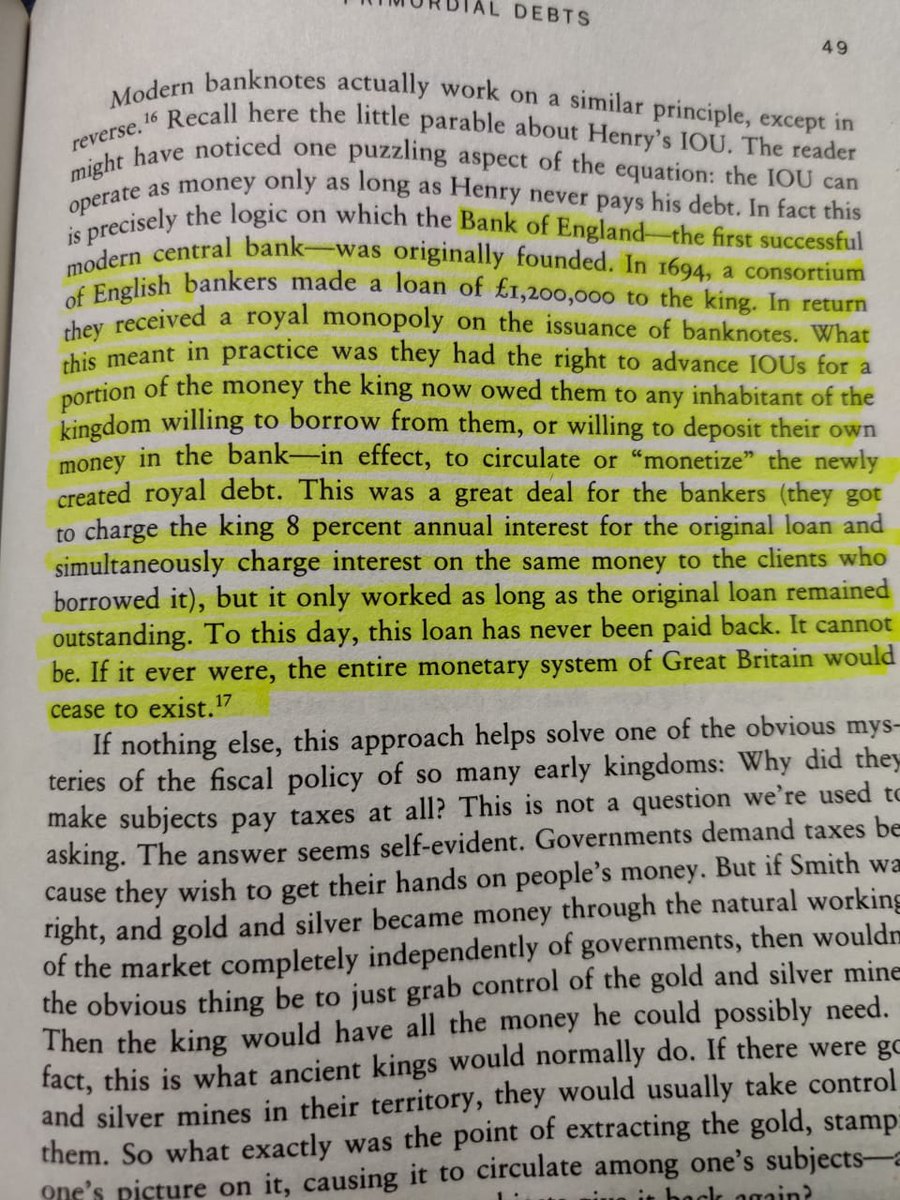 " title="So how does one make the jump from being an accounting tool to being a currency? By state intervention. Bank of England, the first central bank in the world was formed thanks to this onlyhttps://abs.twimg.com/emoji/v2/... draggable="false" alt="👇" title="Rückhand Zeigefinger nach unten" aria-label="Emoji: Rückhand Zeigefinger nach unten">" class="img-responsive" style="max-width:100%;"/>
" title="So how does one make the jump from being an accounting tool to being a currency? By state intervention. Bank of England, the first central bank in the world was formed thanks to this onlyhttps://abs.twimg.com/emoji/v2/... draggable="false" alt="👇" title="Rückhand Zeigefinger nach unten" aria-label="Emoji: Rückhand Zeigefinger nach unten">" class="img-responsive" style="max-width:100%;"/>
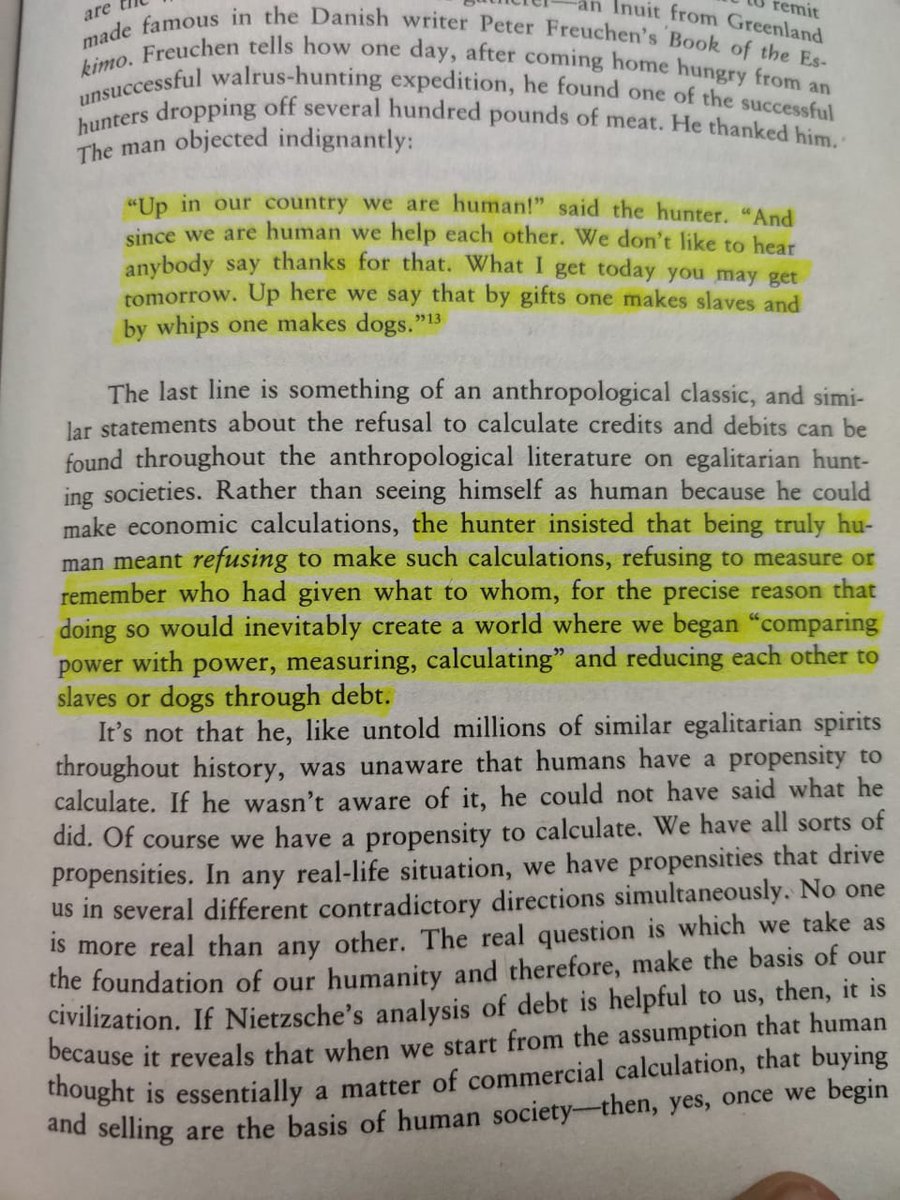 " title="It was believed that humans should help each other without feeling that doing so will make them better than fellow humans. There was no notion of gift or debt. By gift we made a slave and by whip we make dogs https://abs.twimg.com/emoji/v2/... draggable="false" alt="👇" title="Rückhand Zeigefinger nach unten" aria-label="Emoji: Rückhand Zeigefinger nach unten">" class="img-responsive" style="max-width:100%;"/>
" title="It was believed that humans should help each other without feeling that doing so will make them better than fellow humans. There was no notion of gift or debt. By gift we made a slave and by whip we make dogs https://abs.twimg.com/emoji/v2/... draggable="false" alt="👇" title="Rückhand Zeigefinger nach unten" aria-label="Emoji: Rückhand Zeigefinger nach unten">" class="img-responsive" style="max-width:100%;"/>
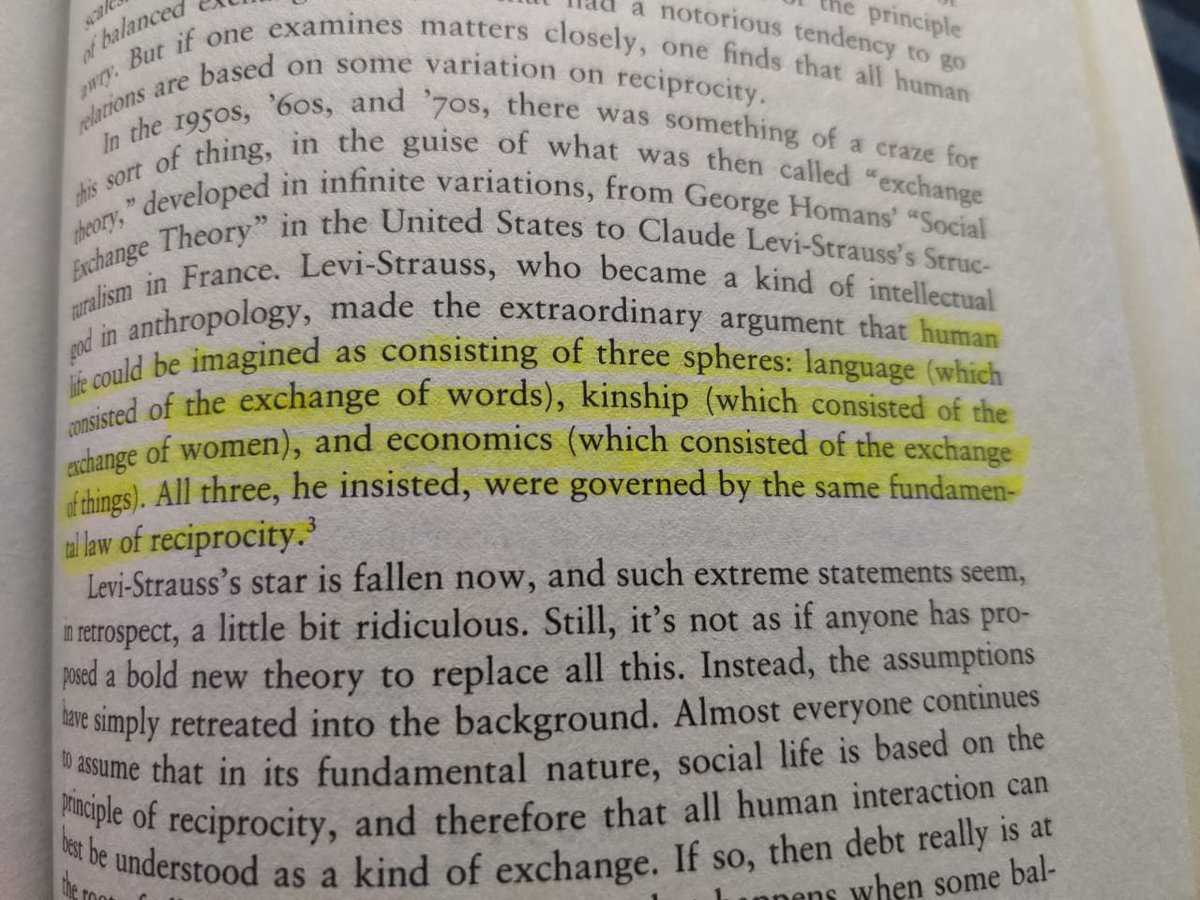 " title="Humans are not motivated by the idea of debt which implies hierarchy or the idea of exchange which is impersonal. we are driven by the idea of interdependence and reciprocity https://abs.twimg.com/emoji/v2/... draggable="false" alt="👇" title="Rückhand Zeigefinger nach unten" aria-label="Emoji: Rückhand Zeigefinger nach unten">" class="img-responsive" style="max-width:100%;"/>
" title="Humans are not motivated by the idea of debt which implies hierarchy or the idea of exchange which is impersonal. we are driven by the idea of interdependence and reciprocity https://abs.twimg.com/emoji/v2/... draggable="false" alt="👇" title="Rückhand Zeigefinger nach unten" aria-label="Emoji: Rückhand Zeigefinger nach unten">" class="img-responsive" style="max-width:100%;"/>
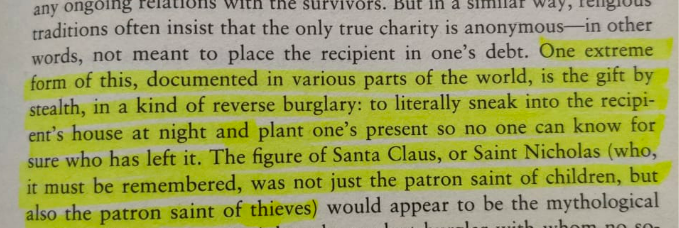 " title="Interestingly St Nicholas ( ie Santa Clause ) who is the patron saint of Kids is also the patron saint of Thiefs. https://abs.twimg.com/emoji/v2/... draggable="false" alt="👇" title="Rückhand Zeigefinger nach unten" aria-label="Emoji: Rückhand Zeigefinger nach unten">" class="img-responsive" style="max-width:100%;"/>
" title="Interestingly St Nicholas ( ie Santa Clause ) who is the patron saint of Kids is also the patron saint of Thiefs. https://abs.twimg.com/emoji/v2/... draggable="false" alt="👇" title="Rückhand Zeigefinger nach unten" aria-label="Emoji: Rückhand Zeigefinger nach unten">" class="img-responsive" style="max-width:100%;"/>
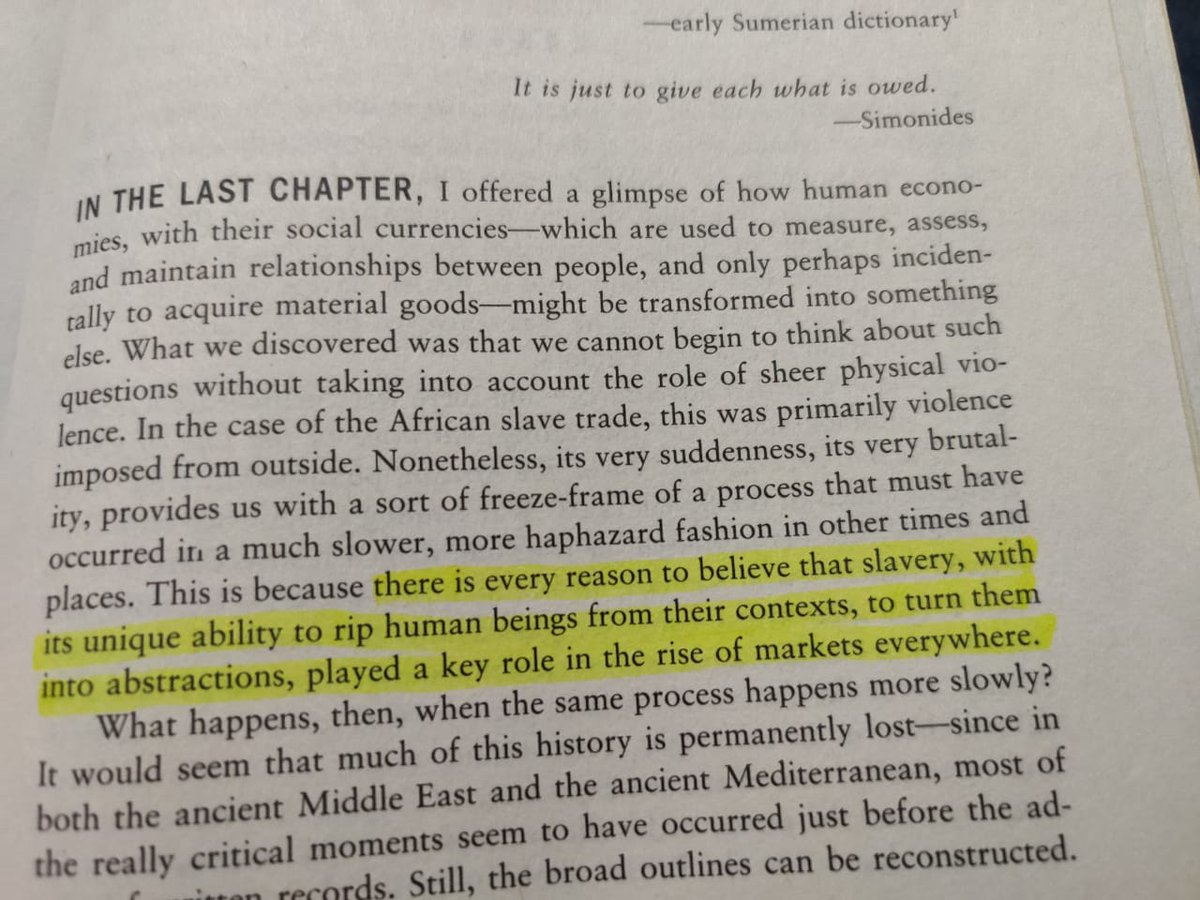
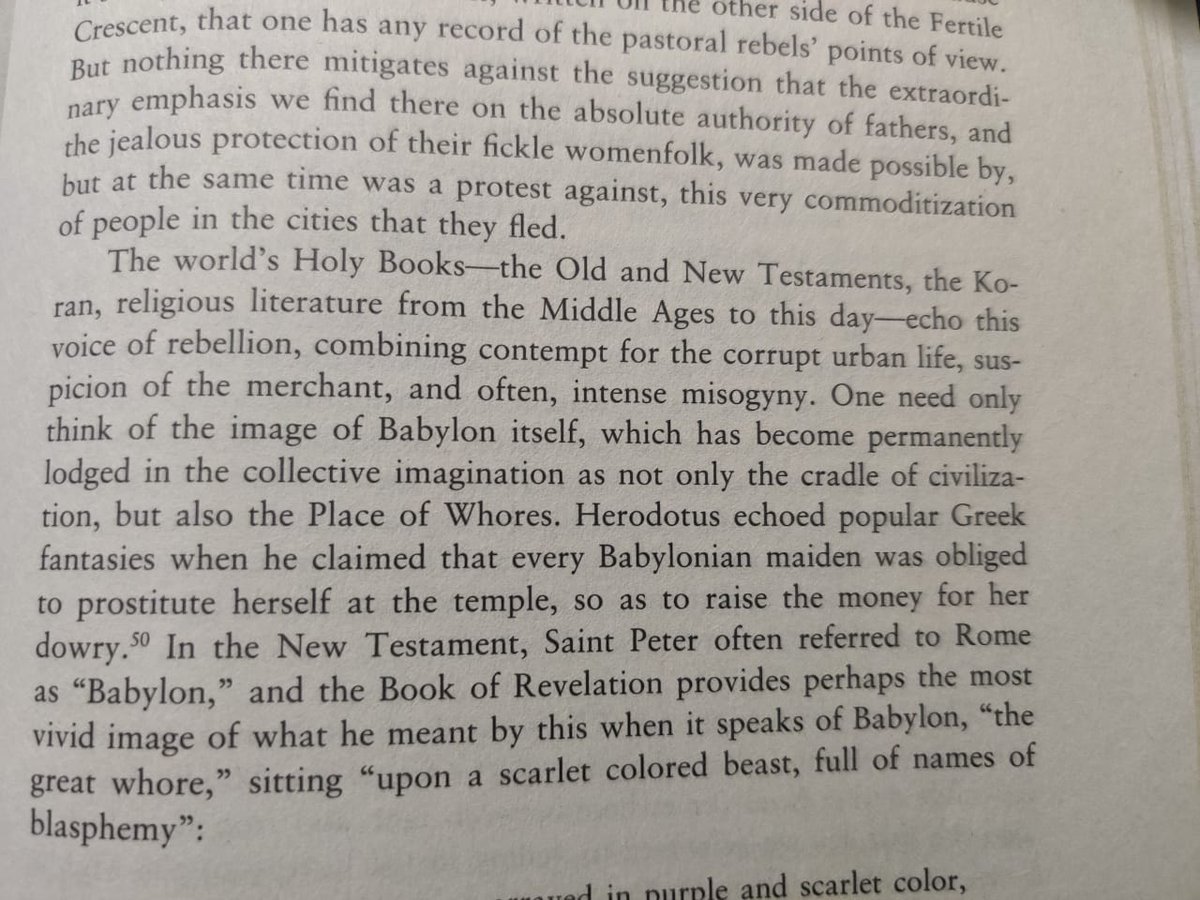
![But these men of honor were not working on ideologies alone. Marketplace dynamics were at work here too. Ergo When people moved to cities flow of money in marriage reversed and the bridewealth [ Man to Woman] converted to dowry [ Woman to Man ]. But these men of honor were not working on ideologies alone. Marketplace dynamics were at work here too. Ergo When people moved to cities flow of money in marriage reversed and the bridewealth [ Man to Woman] converted to dowry [ Woman to Man ].](https://pbs.twimg.com/media/EgG_yIKUcAYvN9k.jpg)
